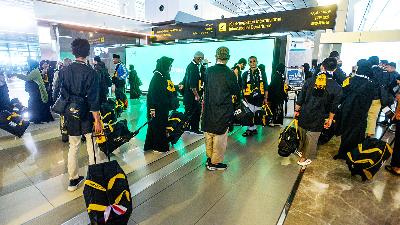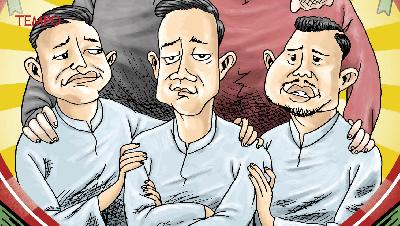Questioning Modern Spiritual Slavery
Thursday, April 4, 2024
Deifying habib is a characteristic of inferior mentality and religious feudalism. It has been cultivated since colonial times.
arsip tempo : 174595884159.

MOCHTAR Lubis’ autocriticism about the character of our society in Manusia Indonesia (Man of Indonesia, 1977) is still relevant today. Although it is often denied, these characteristics continue to live on in our subconscious. Two of them are a feudalistic nature and weak character. We can see these in the praise for those believed to be habib, ‘descendants’ of the Prophet Muhammad.
Simply accepting this doctrine wholesale, some believe that people bearing the title habib have a higher social standing or are more noble. This explains why such people have large numbers of followers even if their actions are far from praiseworthy or even against the law. And this also leads to people frequently falling victim to the wrongdoing of those known as habib. Naive people believe everything they say, like what happened in a number of cases of false habib, including the case in South Kalimantan in the last few years.
The case of Janes Meliawan Wibowo, who calls himself Habib Ahmad Jans Assegaf, which is currently being investigated by the Jakarta Metropolitan Police, also reflects the two characteristics referred to by Mochtar Lubis. Janes set up an Islamic study group on WhatsApp and ordained himself as a teacher. He also produced a blog containing information about his lineage as a ‘descendant’ of the Prophet Muhammad, and claimed he could record similar lineages for those who wished. A number of people who became obsessed with a shortcut to obtaining the title of habib handed over money.
The desire to obtain the title of habib, even if it must be bought, is a tangible example of the perpetuation of religious feudalism. The title of habib gives a person religious authority like that of an ulema. Although the title does not bestow any special rights on the person bearing it, the opinion of Indonesians that a descendant of the Prophet must be respected makes this title important.
Tracing it back, this mental inferiority has been cultivated since the colonial era. The Dutch East Indies government divided people into three groups: Europeans, who were at the top of the social strata; foreign Orientals, including ethnic Chinese and Arabs, as the middle class; and native Indonesians at the lowest level. This inequality gradually came to be seen as fate, then permeated the very souls of our people until it led to a feeling of inferiority that remains to this day.
This sense of inferiority, to borrow from the opinion of psychologist Alfred Adler, leads people to compensate for it by striving for perfection that they do not have. They then forget this mental inferiority by overreacting to something, for example, heaping praise on somebody titled habib without employing any critical thinking at all.
Our societal weakness has often been taken advantage of by those in power, even since the colonial era. According to Imaduddin Utsman al-Bantani, a Nahdlatul Ulama figure who researched the descendants of the Prophet Muhammad in Indonesia, the Dutch once ‘recruited’ a number of people from Yemen to reduce the potential for opposition from Muslims here. These people praised the policies of the government and offered prayers for Queen Wilhelmina. They also condemned rebellion, including that launched by farmers in Banten. Because they were viewed as descendants of the Prophet, many Muslims in the Dutch East Indies paid heed to their words.
Imaduddin’s research concluded that the lineages of a number of ‘descendants’ of the Prophet in Indonesia were not contiguous and were therefore dubious. If subsequent researchers reject Imaduddin’s findings, in any debate over the ‘authenticity’ of descent from the Prophet, they should make people aware that genealogies are recorded by other human beings, and therefore could contain flaws. The revelations about the buying and selling of the habib title are further proof that the status of habib can be attained through deception.
Therefore, any kind of fanaticism about ‘descent’ from the Prophet should be criticized. As well as perpetuating low self-worth, it denies the fact that every person is born equal. In the words of Buya Ahmad Syafii Maarif, “deifying descendants of the Prophet is a form of spiritual slavery.”











